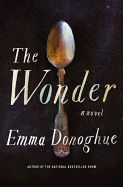
With The Wonder, Emma Donoghue (Room) once again brings her sense of suspense and curiosity to historical fiction. As she did in Frog Music, Donoghue has taken inspiration from true historical mysteries to form the backbone of her imaginative novel. In this case, that inspiration comes from the stories of the "Fasting Girls," young women around the world between the 16th and 20th centuries who claimed to live without food.
In The Wonder, the fasting girl is 11-year-old Anna O'Donnell, whose family claims she has lived without a bite to eat for more than four months. Hoping to prove the truthfulness of these claims, a committee of town leaders brings in two nurses to watch Anna day and night and confirm that she eats nothing during that time. But as the watch continues, Anna begins to weaken, making Nightingale-trained nurse Lib Wright question the morality of her task.
Donoghue has gone to great lengths to make The Wonder feel in and of its time and place, a small Irish village in the mid-19th century. As Lib tends to her charge, readers learn of Florence Nightingale and the Crimean War; the Irish Potato Famine; political tensions between England and Ireland; photography techniques of the time; and religious rituals of 19th-century Irish peoples--to name just some of the historical details included. This rich sense of history combines with Donoghue's expertly imagined story of a fasting girl to deliver a quietly suspenseful novel that explores questions of faith and love--and the lengths to which one might go to prove either, or both. --Kerry McHugh, blogger at Entomology of a Bookworm

